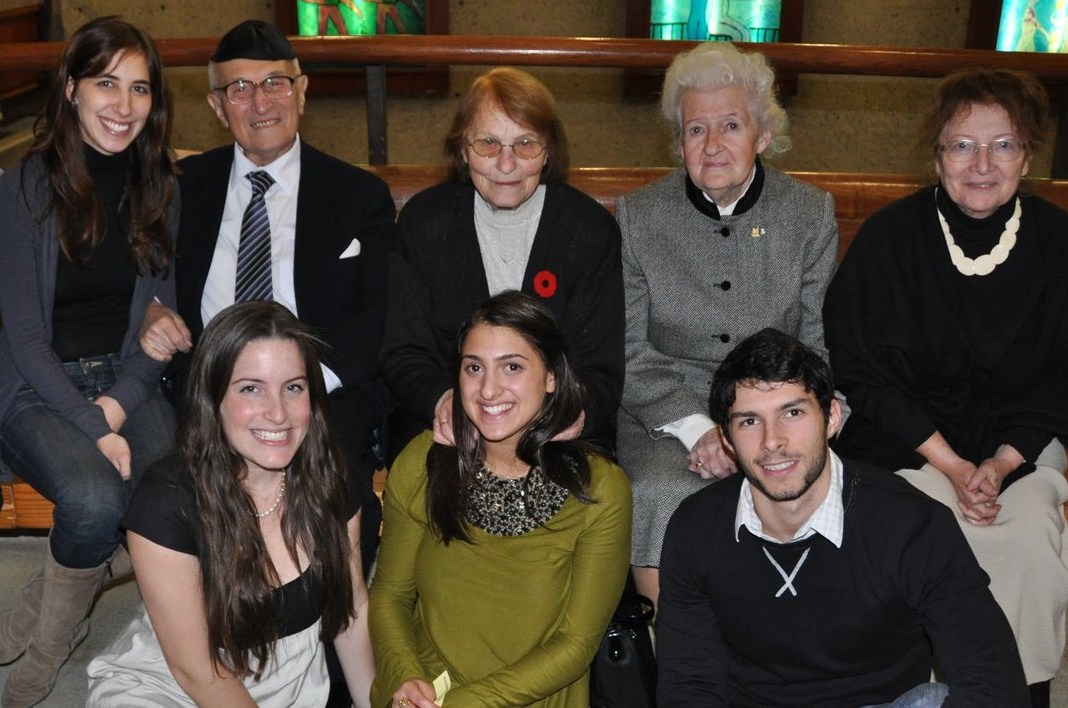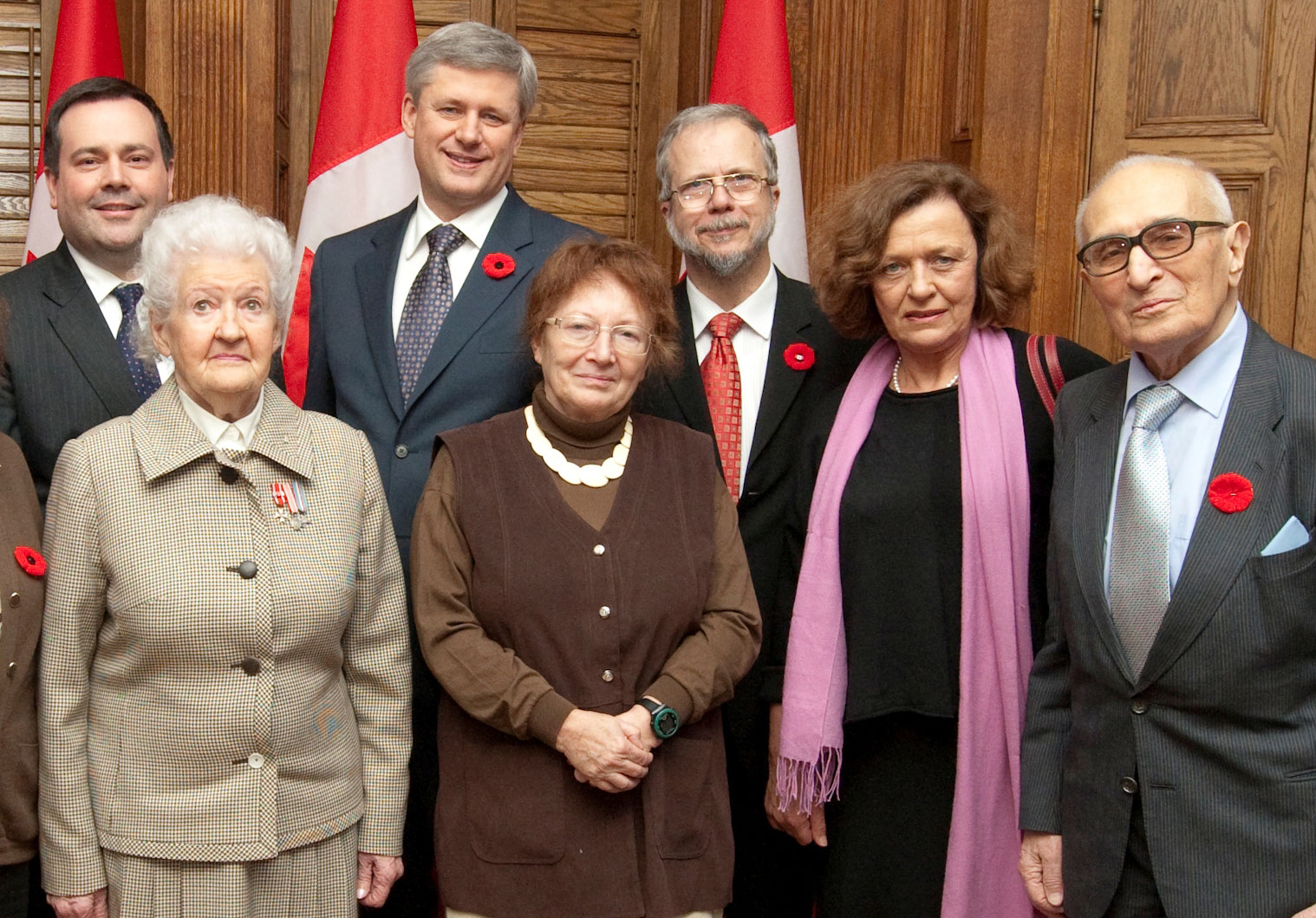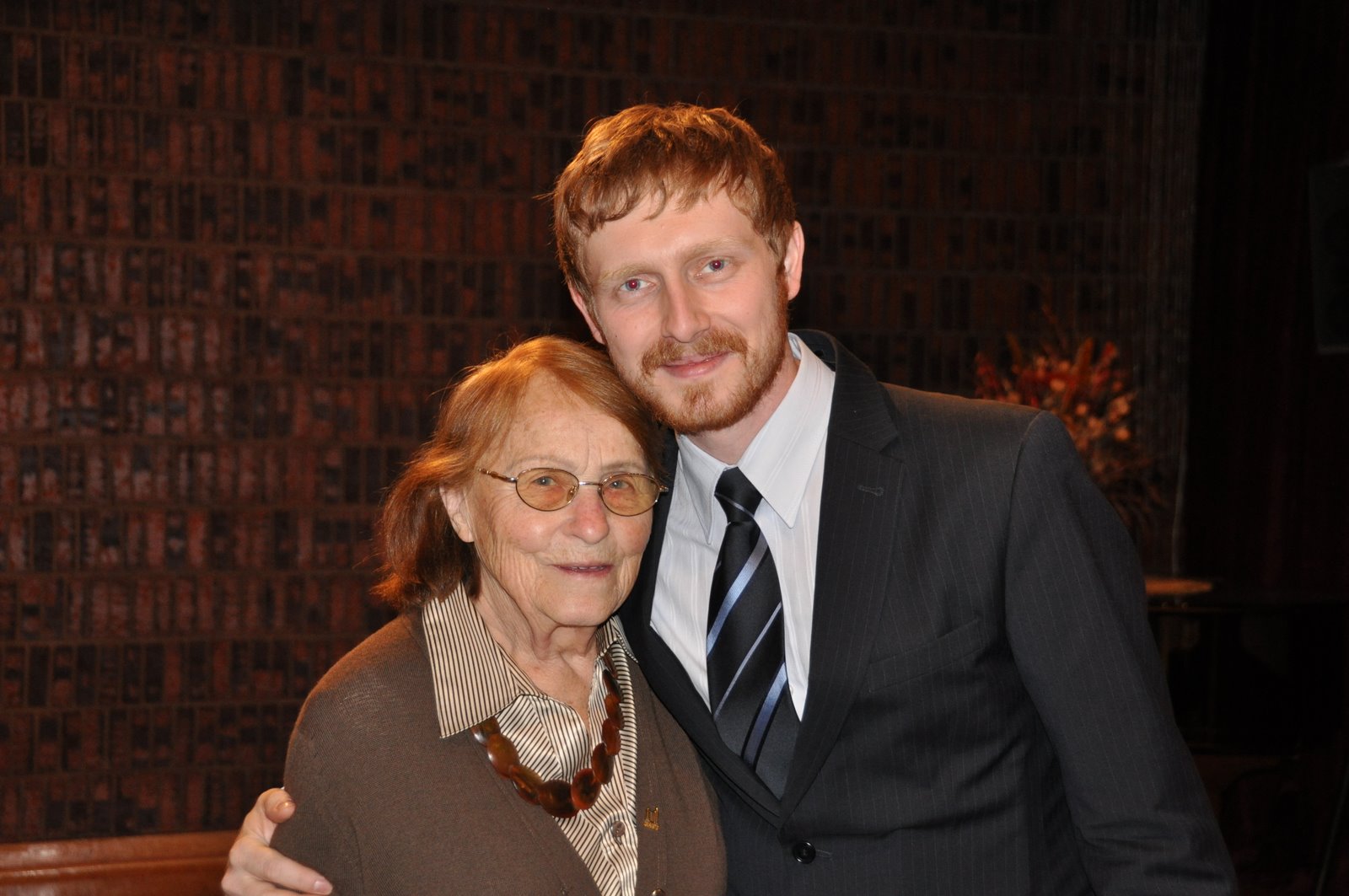 In early November, just in time for Holocaust Education Week, a special delegation from Poland arrived in Canada. Three Righteous Gentiles, who between them saved seven Jews from Nazi terror and helped countless others and a child Holocaust survivor, sheltered and later adopted by a Christian couple, came to tell Canadians their stories.
In early November, just in time for Holocaust Education Week, a special delegation from Poland arrived in Canada. Three Righteous Gentiles, who between them saved seven Jews from Nazi terror and helped countless others and a child Holocaust survivor, sheltered and later adopted by a Christian couple, came to tell Canadians their stories.
As they met with the Prime Minister of Canada Stephen Harper, as they attended theatre and musical performances held in their honour, as they spoke with journalists and with high school and university students, they shared not only their personal stories, but the universal message of human unity and choosing to do the right thing.
Of course, in Nazi-occupied Poland, doing the right thing was not easy. Occupied Poland during WWII was the only Nazi-occupied territory where helping Jews was punished by instant death, no questions asked; execution on the spot, no chance of defence. In these circumstances, the heroic deeds of the Righteous Gentiles reach gargantuan proportions. They knew they were risking not only their own lives but the also the lives of their families by helping Jews. And yet they helped. Out of human decency. More than once and over an extended period of time.
The word ‘hero’ is tarnished with overuse nowadays. We have sports ‘heroes’ and pop culture ‘heroes.’ We might indulge in risky behaviours, but they are usually of the selfish kind. Most of us have no direct experience with war and risking our lives for others is just an idea. An honourable and selfless ideal, one we are taught is the right choice, a choice we’re lucky enough not to have to ponder as we go about our everyday North American lives.
President Barack Obama, honouring a different group of Polish Righteous Gentiles and Holocaust survivors who visited the United States in the spring of 2009, said: “We are awed by your acts of courage and conscience. And your presence today compels each of us to ask ourselves whether we would have done what you did. We can only hope that the answer is yes.”
Marianna Jarosz Krasnodębska, Janina Gutowska Różecka and Marian Gołębiowski, the three Righteous Gentiles who were part of the Polish delegation visiting Toronto, Ottawa and Montreal are but three of more than 6,200 Poles recognized by Yad Vashem, Israel’s official memorial to the Jewish victims of the Holocaust, for their heroism saving Jews during WWII. The award is meant to honour non-Jews who extended aid to Jews without any financial gain expected in return. About 600 Polish Righteous are still alive.

At 90 years of age, Marian Gołębiowski, a Righteous, walks with a spring in his step and possesses an easygoing, friendly manner. “I love people,” he exclaims and one instantly believes him. Charming, animated and funny, he nonetheless becomes serious when asked about his wartime experiences. “You never forget,” he says “and yet you have to go on.” He never forgot a friend, a Polish Catholic who was shot by the Nazis for giving a thirsty Jewish man some water. He never forgot seeing transports of Jews shipped off to concentration camps by the Nazis.
Barely twenty years old when WWII started, he made the choice to act, to help, instead of staying on the sidelines. Asked why he did what he did, he repeats, “I love people. You just can’t refuse help to someone who needs it.” This sentiment is echoed by Marianna Jarosz Krasnodębska, another Righteous, who said “I lived alongside Jews, we went to school together, we played together. We were neighbours, friends, business partners. The war put an end to all that, but we couldn’t just stand there and watch. My friends and neighbours needed help. I helped. It was a human obligation to help.”
Gołębiowski saved the lives of four people, three of them Jews. He regularly supplied Uri Huppert and his mother Teresa Huppert with food in a villa they were hiding in. He also hid Bernard Hellreich (who later changed his name to Ingram), as well as his wife Irena, a gentile, in a series of safehouses. All this while he was working in coal mines to support himself. The hard physical labour damaged his arms and hands, erasing Gołębiowski’s dream of becoming a concert pianist. Before the war he had studied law at Lvov University while also studying piano and planning a career in music.
Gołębiowski admits he felt afraid on many occasions. Moving around during the war was not easy and he had to plot various roundabout routes trying to evade checkpoints in order to bring food to the Hupperts in the countryside. On one occasion, he entered the ghetto in Tarnapol (now Ternopil in Ukraine), where Hellreich was a doctor with the intention of helping him escape. He wrapped his hands in towels before jumping the brick wall surrounding the ghetto. He hung from the wall, eventually losing feeling in his hands while waiting for a signal from the other side letting him know it was safe to land. Soon he could hear German soldiers on either side of the wall. He thought he was done. Then, finally the signal came. Someone diverted the Germans’ attention. He only had a moment to jump to the other side, his hands bleeding. He admits he was lucky that time, coming very close to not making it.
Speaking with Gołębiowski, it is clear he is a very positive person, the type for whom the glass is always half-full. His own father died during the war after being deported to Siberia by the Soviets, but he doesn’t dwell on that. Since he could no longer become a pianist after the war, he studied law instead and eventually became the deputy director of the Warsaw National Philharmonic, traveling the world with them. Always staying close to the music world, he has published four books about the Wroclaw and Warsaw National Philharmonic. He regularly visits schools in Warsaw in order to talk to students about his wartime experiences. What happened to those he saved? Uri Huppert and his mother emigrated to Israel after WWII, where he became a prominent lawyer and writer. Bernard Hellreich, now Ingram, emigrated with his wife to Australia, where he continued his medical career.
Joanna Sobolewska-Pyz, another member of the Polish delegation and a child Holocaust survivor provides a different insight into the story of wartime survival. Born to Jewish parents who probably lost their lives in a concentration camp, at the age of four she was sheltered and later adopted by a Polish Catholic couple. She is still looking for information on how her biological parents perished and is forever looking for any family members who may have survived.
Meeting with young people comes naturally to the third Righteous Gentile in the group. At 87, Janina Gutowska Różecka still teaches her favourite subject, history, at Sempołowska High School in Warsaw. “I’ve never missed my students’ prom,” she chuckles. “I know how important it is for young people to hear first-hand accounts of what happened.” Having lost her father in the Katyn massacre on Stalin’s orders, having been a member of the Home Army, having saved the lives of two young Jews and having participated in the Warsaw Uprising, Różecka has many stories to tell and she takes her responsibility to share the horrors she lived through seriously.
 “In Poland we are now in a hurry to honour the Righteous who are leaving us so quickly, and we are paying our belated respects to the families of those who have already passed away,” writes Ewa Junczyk-Ziomecka, Secretary of State at the Chancellery of the President of Poland, who accompanied the delegation to Canada. “Meeting the Righteous is a life changing experience,” she continues.
“In Poland we are now in a hurry to honour the Righteous who are leaving us so quickly, and we are paying our belated respects to the families of those who have already passed away,” writes Ewa Junczyk-Ziomecka, Secretary of State at the Chancellery of the President of Poland, who accompanied the delegation to Canada. “Meeting the Righteous is a life changing experience,” she continues.
Canadians who got to meet the Righteous on their tour agree. Kortney Shapiro, Vice-President PR & Programming at McGill Hillel and organizer of the Holocaust Education Week Shabbat Dinner held at McGill University in Montreal, jumped at the chance to have the Righteous Gentiles as guests. “Given the opportunity, I’d do this again in a hearbeat.” How did meeting the Righteous affect her? “I’ve grown up listening to stories about the Holocaust told by my grandmother and other Holocaust survivors, but I must say that meeting the Righteous Gentiles gave me a wider perspective about something I’ve been learning about for so long, it opened a door to another facet of that education. It just goes to show there were many types of survivors and many heroes and they [the Righteous] were both, they put their lives in danger.”
Kristen Brazeau, a Grade 10 student at Ashbury College in Ottawa, which the Righteous visited on their tour, admits she didn’t know all that much about what being a Righteous Gentile meant before she got to meet one in person. “I knew it was a high-ranking award, that’s all. Now I know much more about it.” Dylan Si, also a Grade 10 student at Ashbury College had a similar experience. “I didn’t know much before. Now I know that the Righteous risked their lives to save Jews, were selfless and didn’t expect anything in return. Meeting them in person really touched my heart.”
>Sharing their stories with Canadian youth is exactly why the Righteous came here. As much as they were touched by being honoured by B’nai Brith, as much as they enjoyed meeting with Prime Minister Harper, as happy as they were to be guests of honour at various concerts, they all agree that engaging with young people gave them the most satisfaction. “We won’t be here much longer,” Marian Gołębiowski said. “We’re passing on the torch.”
CR
Imagery
- Photo by Anna Ronij: The Polish delegation with student members of McGill Hillel, in the back row, from right to left: Joanna Sobolewska-Pyz, child survivor of the Holocaust, Janina Gutowska Różecka, Righteous, Marianna Jarosz Krasnodębska, Righteous, Marian Gołębiowski, Rigtheous; in the front row, from left: Kortney Shapiro, Lynn Khazzam from McGill Hillel.
- Photo courtesy of the Embassy of Poland in Canada: back row, left to right: Jason Kenney, Canada’s Minister of Citizenship, Immigration and Multiculturalism, Stephen Harper, Prime Minister of Canada, Piotr Ogrodzinski, Polish Ambassador to Canada; front row left to right: Janina Gutowska Różecka, Righteous, Joanna Sobolewska-Pyz, child survivor of the Holocaust, Ewa Junczyk-Ziomecka, Secretary of State at the Chancellery of the President of Poland, Marian Gołębiowski, Righteous;
- Photo by Anna Ronij: Marianna Jarosz Krasnodębska, Righteous, with Jakub Jaskółowski, representative of the Chancellery of the President of Poland.



